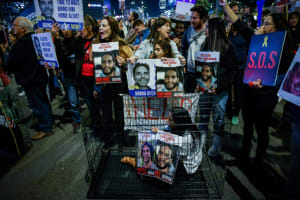Mixed messages: Hamas said to ‘examine’ latest hostage deal proposal after initial reports of rejection
Yahya Sinwar speaks during a meeting, in Gaza City, on April 30, 2022 (Photo: Attia Muhammed/Flash90).
After initial statements suggested that Hamas had again once rejected the latest hostage deal proposal by Israel and the U.S., an official Hamas statement later on Monday night said it was “examining” the offer and would issue an official response later.
“Even though the Israeli position was intransigent and did not respond to any of the demands of our people and the resistance – the leadership of the movement is examining the proposal that was submitted and will inform the mediators of its answer when it is finished,” the statement read.
Earlier in the evening, Hamas official Ali Baraka had told Reuters that the politburo had decided to reject the proposal.
This points to renewed tensions between the Hamas leadership in Gaza under Yahya Sinwar, who is expected to make a final decision, and the political leadership of the terror group, which is based in Qatar.
Last Sunday in Cairo, CIA Director Bill Burns presented the latest deal proposal to Israel’s Mossad director, Qatar’s prime minister and Egypt’s intelligence chief. The proposal aims to reach an agreement on a six-week ceasefire in exchange for Hamas releasing 40 Israeli hostages.
A senior Hamas delegation was in Cairo at the same time and held separate meetings with the Egyptian and Qatari mediators. A spokesperson for the Qatari Foreign Ministry dubbed the meetings in Cairo “encouraging.”
According to Al Jazeera, the proposal calls for Israel to release around 900 Palestinian prisoners, including 100 so-called “heavy” prisoners serving life sentences for murders.
Initially, Israel demanded Hamas release 40 living hostages from among the “category” of women, female soldiers, men over the age of 50, and men under 50 with serious medical conditions.
However, Channel 12 news reported on Monday that Hamas told mediators it didn’t have 40 living hostages from among this category, creating a serious obstacle in the negotiations.
Speaking with the Axios news outlet, a senior Israeli official confirmed this, adding that Israel, in turn, demanded a single-digit number of hostages from other categories, presumably men under 50 or soldiers, to be released, offering to free more prisoners in return.
Ynet News reported that Hamas has also demanded a higher number of heavy prisoners to be freed.
If Hamas agreed to Israel’s demands regarding the hostages, according to Axios, Israel would be ready to compromise on the return of Gazans to the northern Gaza Strip, which had been a red line until now.
According to Al Jazeera, Hamas demands that up to 6,000 people be allowed to return to their homes in the north per day. Israel wants the ability to check the returnees to ensure no terrorists are entering the northern part, which Hamas is still rejecting.
The U.S. proposal includes a gradual Israeli withdrawal of the IDF troops – the only ones left on the ground – securing the corridor that splits Gaza into northern and southern parts, Axios reported.
🚚419 humanitarian aid trucks were inspected and transferred to Gaza today (Apr. 8). This is the highest number of aid trucks that entered Gaza in one day since the start of the war. It follows a previous high of 322 trucks that were inspected and facilitated yesterday.
👇 pic.twitter.com/zsJ4TWly6v— COGAT (@cogatonline) April 8, 2024
While the proposal also envisions the daily entrance of 500 aid trucks into the strip, Israeli officials told Ynet they were frustrated with the recent pressure on Israel to increase the aid before a deal has even been reached.
According to the Coordination of Government Activities in the Territories (COGAT), the IDF unit responsible for activities in Gaza, Tuesday saw the entry of 419 humanitarian aid trucks into Gaza, marking the highest number since the war began.
The significant increase in humanitarian aid was an important negotiating card in the talks with Hamas, the officials said.
Hamas received the aid without making any concessions in return, which some argue could weaken Israel’s position and reduce the chances of releasing the hostages from Gaza.
We recommend to read:




